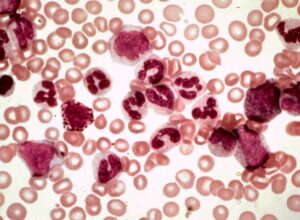 While busulfan is used to treat patients with chronic myeloid leukemia (CML), it has been demonstrated that imatinib, a tyrosine kinase inhibitor (TKI), has become a cost-effective first-line treatment despite chronic side effects observed in many patients.
While busulfan is used to treat patients with chronic myeloid leukemia (CML), it has been demonstrated that imatinib, a tyrosine kinase inhibitor (TKI), has become a cost-effective first-line treatment despite chronic side effects observed in many patients.
Serious and cumulative toxicity has been observed with tyrosine kinase inhibitors that had been expected to replace imatinib. Treatment-free remissions have become an important new treatment goal of CML.
Some expectations remain unmet, however. Most patients require life-long maintenance therapy whereas busulfan treatments are a four-day treatment.
Also, progression to blast crisis still occurs in 5% to 7% of patients and remains a challenge. Blast crisis is the terminal phase of chronic myelogenous leukemia (CML), a clonal myeloproliferative disorder of the hematopoietic stem cell that typically evolves in 3 distinct clinical stages: chronic and accelerated phases and blast crisis. The chronic phase lasts several years and is characterized by accumulation of myeloid precursors and mature cells in bone marrow, peripheral blood, and extramedullary sites.
CML has now become the model disease for treating other leukemias or cancers using TKI.
